wayne&wax
linkthink re: hip-hop, reggae, the US, jamaica, and anything else wayne wants to wax on
10.31.2005
10.30.2005
shining stars, mixing metaphors

in the spirit of taut, little (brilliantly simple?) metaphors for fairly high theories, here are two good ones about post-structuralism:
1) from deridda, via alexander weheliye's phonographies: grooves in sonic afro-modernity:
As soon as one admits that all terms in an analogical relation already are caught up, one by one, in a metaphorical relation, everything begins to function no longer as a sun, but as a star, the punctual source of truth or properness remaining invisible or nocturnal. (52)
2) from marshall sahlins, via his truly prickly pear pamphlet, waiting for foucault, and other aphorisms:
This is a modern American folk-tale to the same effect: Three umpires of major league baseball were debating how to call balls and strikes. "I calls 'em the way they is," the first said. "Me," said the second, "I calls 'em the way I sees 'em." "Naw," declared the third, who had been around the longest, "they ain't nothin' till I calls 'em." (11)
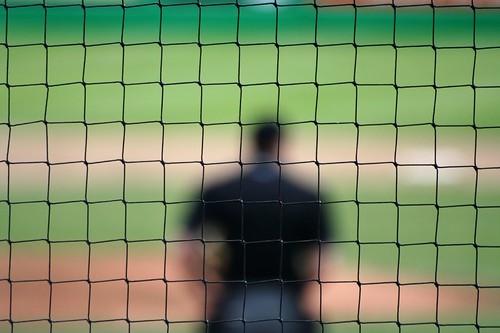
10.28.2005
uptown bwoys claim roots, branches

i've got a piece in this week's boston phoenix on the new albums from damian marley and sean paul. as one might expect, i focus as much on context as content. for those who've read my previous posts about mr.marley's music, you will find echoes of the same critiques here. my main concern was to communicate some of the complexities of this music to an audience that knows very little about reggae or jamaica.
as i've done before, i will reprint a version closer to the original below, especially since in this case an overzealous copy-editor has excised some of my subtler points and, in the worst cases, replaced straightforward descriptors such as "finest producers" with slightly pejorative terms like "fancy producers." (for the record, i would never call lenky, don, snowcone, or jeremy harding "fancy.") in another instance, my array of places-that-begin-with-n-where-bob-is-big was misguidedly truncated, cutting an essential reference to "northeastern" (which i was employing as a metonym for bob's fabled frat following).
that said, i think the piece still says a lot, and i'm grateful for the opportunity to get it into print and to reach an audience outside of the blogeoisie.
[snip]
Uptown Bwoys Claim Roots, Branches
It may come as a surprise to some that Bob Marley, worldwide icon and Third World superstar, finds less favor in Jamaica than maybe anywhere else.
Don't get it twisted, star: "Bob," as most Jamaicans call him, is as much a Legend, if not a demigod, inna JA as, say, New Zealand, Nigeria, Navaho Reservations, or Northeastern. But Bob's success — not to diminish the irrefutable greatness of his music — was achieved in part through the savvy marketing and executive production of Island Records' mogul Chris Blackwell, who remixed Marley's music in London studios, overdubbing rock guitars and "cleaning up" the raw and ready sounds of the Wailers, and who sold Marley to the (First) world as a righteous rock star, a Rolling Stone Rasta for the middle-class masses.
Although Kingston's dancehall massive — which, at its core, is far from middle-class — has generally endorsed Bob's success, giving thanks for the minds and markets his musical ministry opened, they have long embraced performers who speak more directly to their concerns in a voice they better recognize: Dennis Brown, Yellowman, Buju Banton, Bounty Killer. An enduring tension remains for reggae artists who seek to move the massive at home and reach the masses abroad. Striking a balance between international appeal — irresistible in its riches — and local tastes has become the goal of many an aspiring entertainer in Jamaica. Two recent reggae releases, Damian "Jr. Gong" Marley's Welcome to Jamrock (Universal) and Sean Paul's The Trinity (Atlantic), reveal rather different ways of walking this tightrope.
Where Damian takes on social issues, Sean Paul socializes. Where Damian rasps his raps somewhere between Buju's gravel and his father's moan, Sean Paul emulates the smooth sing-song of Super Cat. Where Damian flashes his locks, Sean Paul flashes his watch. Jamrock features American mainstays Bobby Brown, Black Thought, and Nas, while The Trinity brings along uptown brethren Looga Man and Kid Kurup, Wayne Marshall (no, not me), and newcomer Tami Chynn. (Of course, Jamrock also hosts the likes of Eek-A-Mouse and Bounty Killer, two dancehall DJs with impeccable cred.) While Damian and his brother Stephen program their own beats and use a crack Jamaican house band on several cuts, Sean Paul employs dancehall's hottest producers: Lenky, Snowcone, Don Corleone, and mastermind Jeremy Harding. And, yet, there's something strikingly similar about the ways these two artists project their sounds and images to the world.
Despite the differences, their struts are the same. There's an uptown air about both artists, a cosmopolitan flair, an ease about floating through the world. Unlike many Jamaicans, they are free to move. (Both are jetsetters, to their credit — Sean Paul's been to Egypt twice since "Gimme the Light" set the world on fire, and Damian has called Miami home for many years now.) Yet, for all their mobility, one feels the tugs — weh do what dem got to — of Jamaican roots. Anchoring themselves to reggae's solid foundation, Damian and Sean Paul ride the waves of international pop (which is to say, hip-hop smoothed out on a R&B tip with a dancehall feel-appeal to it), and they do so with buoyancy and flow. Both performers display a strong hip-hop sensibility, mixing dancehall's steady-rock declamations with rap's multisyllabic, over-the-bar rhyme-schemes, while peppering their patois with "jiggy" slang (which is to say, often outdated, but still resonant in Kingston). Remarkably, their embrace of hip-hop style, which is far from total, neither endears them to nor alienates them from their local following.
For one thing, partly because of their literal and figurative distance from downtown, neither Marley nor Sean Paul has ever been fully accepted by dancehall denizens. Sure, they each have their anthems and their hits — tracks that selectors "pull-up" even at the most dungtung venues. But, in general, they are ignored, overlooked, and sometimes reviled. Sean Paul records on most of the popular riddims that come out and thus gets some play in the dancehalls, juggled alongside more hardcore acts, whereas Damian operates as more of an outsider, reaching the island's open ears on smashes such as "Welcome to Jamrock" but otherwise appearing as a specter of sorts, occupying that hallowed but somewhat hollowed place reserved for the Marley dynasty. His 2001 Grammy award tells you something about his established reputation abroad. The winning album's title, Half-Way Tree, referring to the city square where uptown and downtown meet, tells you something about the way Marley self-consciously positions himself.
For another, hip-hop's presence in Jamaica is not — and never has been — odd or problematic in itself: Jamaicans of all stripes long ago embraced hip-hop (and, more generally, the sounds of black America). Only a few months after "Rapper’s Delight" brought hip-hop to the wider world in 1979, Welton Irie worked part of the track into his tune "Hotter Reggae Music." In Jamaica, hip-hop can signify militant, pan-Africanist blackness, t(h)ug/hustler pragmatism, and cosmopolitan, pan-American dreams. Most Jamaicans, however, draw a subtle but firm line between embracing reggae's Yankee cousin and falling victim to "foreign mind." Enduring inequalities that correlate all too well with one's shade of skin, and one's freedom to move, exert no small pressure on the meanings of music and culture in Jamaica.
But meanings shade differently in different contexts, and there are many — in Jamaica and abroad — who revel in the success of Marley and Sean Paul with that consummate pride that West Indian folk feel for their fellows. The ever-increasing number of people invested in reggae — an international audience of aficionados and devoted practitioners — itself ensures an enthusiastic reception of any chunes big enough to reach a farin. Of course, mainstream America has already demonstrated its approval of both acts: The Trinity is the biggest reggae debut in the U.S. to date, with 107,000 copies sold in the week after its release on September 27; prior to The Trinity that record was held by Marley's Welcome to Jamrock, which moved 85,000 units when it was released two weeks earlier.
Their success is well earned. Author Jeff Chang rightly pronounces Damian's album to be "the best Marley album ever by someone not named Bob." Damian's got flow, no doubt, while the Marley boys prove themselves to be competent, versatile producers, if a bit hit-or-miss. At times they range a likkle too far across the map, falling into SNL-sax-style, smooth-jazz sinkholes and taking a few too many cues from Eric Clapton's "I Shot the Sheriff" rather than their father's version. But overall the beats are hard and polished, and Damian's vocals show both growth and potential. His righteousness is as inspiring as it is cloying, unfortunately, which makes for a bumpy ride but gives you a good sense of the lay of the land. And, of course, the big chune of big chunes of 2005, "Welcome to Jamrock," is itself worth the price of admission — my own, and others', qualms about its contradictions notwithstanding.
Considering that both compete in the same marketplace, for my money, Sean Paul's album is the better of the two. The Trinity is power pop par excellence. Sticking to some of dancehall's finest producers, it boasts the better riddims. No schmaltzy overproduction here, just bear Triton funk. And Sean Paul has always been wicked when voicing in the studio: his sing-song hooks are well-crafted and tuneful (if simply so), his verses immaculately delivered, and his overdubs sweet as ever in their strange-but-smooth harmonies. Sean Paul's songwriting rarely strays from seduction or sexual prowess, but perhaps that's for the best. A couple ventures into more serious topics lack the grace of his regular efforts. Mainly, they lack the levity of what we've come to expect from Sean Paul. His music is, on the main, lighter than Marley's. Maybe that's why his confections go down easier.
10.27.2005
that time of the month

tonight at river gods:
me, dj bc, and dj drisky (a/k/a lone wolf)
we'll be playing simultaneous records and sequential records. also mp3s.
mashups, hip-hop, reggae, reggaeton, boston bounce, and all kinds of freshness.
10pm-1am. no cover.
10.26.2005
that's jackbackrack

this week at beatresearch, local artist and digital-media-master jackbackrack debuted his programmable percussion performance process, beatrix. inspired by the demands of west african drumming and the wonders of text-editor interfaces, jb created his own flexible, powerful program for laying down rhythmic patterns.
this is one of many projects for jb, who spends his days at MIT's AI lab and whose own artistic endeavors often embody many of the institution's crowning cornerstones: technical innovation, playfulness, elegance in form and function. the text view, as seen below, and the cyclic view above, both demonstrate this in their simplicity, comprehensibility, and quirky beauty.

what's more, jb picked good sounds for the program: crisp percussion and deep tones (including the recent addition of a sweet bass!). and beatrix is real-time playable, including the ability to create separate lines and sections and to layer them or play them alternately. jb's performance monday night demonstrated beatrix's range (and his own fluency with it), as he developed a gradually shifting groove and constantly varied the texture over the course of an hour or so.

i've written before on this blog about jackbackrack's work, and his video pieces are similarly striking in their originality, virtuosity, elegance, and playfulness. not surprisingly, jb's video stuff is also highly programmed/programmable--that is, it's not about applying effects in finalcutpro; it's about programming a video-playing language you can play with. i've seen several projects that he's created using a language he calls gooze, and they're almost uniformly breathtaking, often producing rich, complex effects through a combination of fairly simple manipulations.
frequently, jb displays his latest gooze-achieved effects at exhibits where one can watch oneself thusly effect-ed in realtime, which is, of course, entrancing. (never mind the idiot box, sit some kids--or adults--in front of one of these camera/screen combos and they'll dance themselves to sleep.) a couple weeks ago, jb took a bunch of bollywood films as his subjects and flanked the original footage with two screens of gorgeously filtered versions of it:
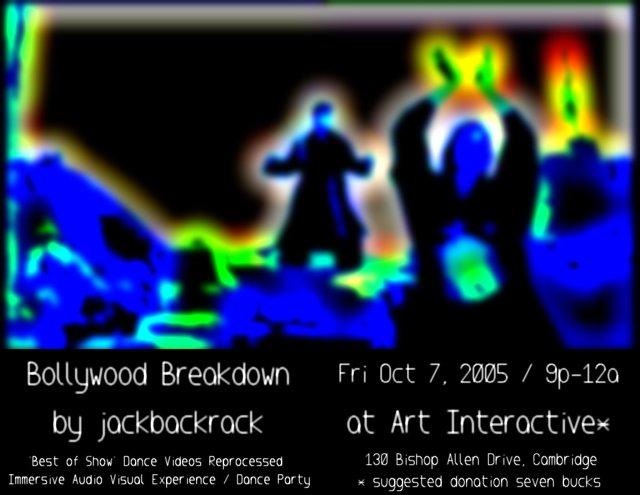
mark my words: the first person to make a music video using one--or better, several--of jb's gooze-produced effects will have a runaway hit on their hands.
i've only played around with beatrix a little bit, though i see its potential and i hope to spend more time with it soon. i suspect that for certain aspiring musicians among hardcore programmers out there, beatrix could be a kind of super sheep beats. but the program is intuitive and fun enough--and, of course, so well documented--that anyone with even a passing interest in beats will find it engaging and worth their time. finally, those who have used step-based sequencers such as fruityloops or reason's redrum or any number of others will find the interface here rather familiar, if less boxed-in.
check it out. and if you have any feedback, jb asks that you share it with him. (you can find his email in the manual.) as good as it is, he wants to make beatrix the best it can be.
10.25.2005
that's trackback, jack
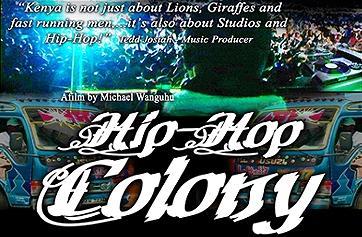
michael wanguhu is a young kenyan filmmaker. his new film, hip-hop colony, is a vivid portrayal of hip-hop's presence in contemporary kenya. although explicitly mindful of the ways that hip-hop can be seen as yet another colonial force, the film shows the many ways that kenyan artists make hip-hop their own, re-localizing its forms and practices for their own purposes and in their own language(s). as much as their voices sometimes ring with the familiar grain of a 50 or j-hova (or, yes, a buju), their self-consciousness about such appropriations and about their projections of kenyanness--often via sheng and swahili and invocations of mau mau, though also in more subtle ways--demonstrates with clarity that there is little hegemon/homogen-ization at play here. this is a more complex story, and wanguhu's filmmaking does it justice, offering up interviews, freestyle ciphers, and local performances as evidence.
hip-hop colony thus flips the contemporary colonial/globalization narrative the same way kenyan rappers flip the scripts of african-american (and afro-jamaican) music. writing their own chapter in the story of hip-hop (and dancehall), they show it to be a global form with routes as wide as its roots are deep. one of the film's most interesting aspects (at least for me) is its almost entirely unremarked documentation of the influence of dancehall reggae in kenya's hip-hop scene. although serving more as a subtext and rarely remarked on, it was evident that that kenyan hip-hop artists, as with their brethren worldwide, embrace the sounds of jamaica along with the sounds of the U.S., mixing dancehall riddims and hip-hop beats, patois and slang, all rather seamlessly.
what the film evokes perhaps most powerfully is how fluidly, how fluently kenyan artists version these foreign but familiar materials. the audience at the screening i attended last week let out its largest collective laugh when one young MC rapped something like, "got a girlfriend, half-japanese, half-puerto-rican / she probably cookin' up some rice as i'm speaking." it was clear from moments like these that hip-hop has been able to communicate, in a rather intimate and resonant way, the experiences and aspirations and imaginations of its practitioners (stereotypes included) to audiences far, far away. and though one sad converse of such moments is the realization of how rare it is for americans to resonate with the experiences and perspectives of, say, kenyan youth, a film like hip-hop colony proves that such an identification is not at all far-fetched.
one corrective to that asymmetry would be for films like this one to be shown far and wide. currently, hip-hop colony is touring the US, making stops at colleges and arthouses. there is hope for a wider release, including a DVD (which would be great, especially for those of us who like to set-up screenings of our own at colleges, etc.). try to catch it when it comes through your area (see the schedule on the site), check out the trailer here, and keep your eyes peeled (and make your voice heard) for a wider release.
+++
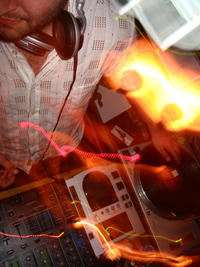
n-ron and leftenant are mixtape-making edutainers. their latest, a thunder sound, weaves together various strands of the afrofuturistdiaspora, linking dancehall, hip-hop, baile funk, grime, leftfield electro, and field recordings in a dense web of sound (see tracklist). underpinned by a number of strong remixes, including a wicked fix of lady sovereign's "random," the mix offers some surprises amidst the twin pleasures of recognition and jutaposition. the degree to which their selections overlap with my own listening preferences from the last few years is kind of shocking (and great fun), but then again, the mix found me for a reason. still, any mix that brings together ethnomusicologists, bjork, dancehall versions of cyndi lauper, and antipop's beans is no average effort. a thunder sound not only unites these seemingly disparate sources, it does so impeccably, with nary a transition to be questioned. i myself was won over in the first few seconds by their decision to begin with a recording that is a longtime favorite of mine: postal workers cancelling stamps at the university of ghana post-office (as recorded by ethnomusicologist jim koetting)--perhaps the most joyful sounds of "work" that you'll ever hear. from there, n-ron and leftenant do all the work, piling on the styles and pulling them apart again, revealing sonic and social links in the process.
these are imaginary links, yes, but real, too--and they are made real by their materiality as sonic force, as things felt and heard and vibrated to. n-ron and leftenant thus edify as they engage; their musical articulations are pointed and political. this is some serious culture mashing (despite the occasional reference to punaany and guntalk, which, after all, have their place in all of this). a thunder sound is the sound of an electrified urban globality, an intensely networked place negotiating its connectedness, a cosmopolitan cosmos in which we remember with vigilance what's underneath even the happiest seeming beats. for all its thunder, it is a sound like lightning, cracking open possibilities, connecting here and there, then and now, high and low, fast and slow in one electric instant.
(you can catch an mp3 of a thunder sound over at dubquixote's.)
+++
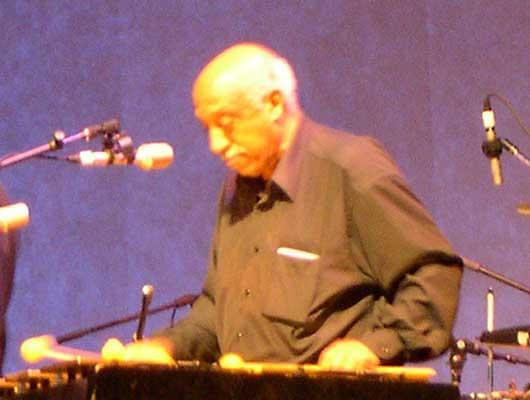
mulatu astatqe is a master musician from ethiopia who put down roots in boston back in the 1950s when he came to the city as a student at the school that would one day become berklee. after this period of study, he returned to ethiopia and made a major mark on its music scene, essentially inventing what came to be called ethio jazz. recently, mulatu has garnered some (long overdue) attention here in the states due to the inclusion of his music on the soundtrack to jim jarmusch's broken flowers.
i had the pleasure of seeing mulatu perform here in cambridge this past weekend. he was in town to accompany the either/orchestra, a local jazz band that has included ethiopian songs in its repertory for some time. recently he and the either/orchestra collaborated on what has become the latest issue in the wonderful ethiopiques series, ethiopiques 20: live in addis. (you can hear mulatu and either/orchestra leader, russ gershon, discuss the collaboration with christopher lydon on his open source radio program here.)
their show at the lizard lounge on friday night was entrancing. forming an inward looking circle in order to fit into a small space and keep the lines of communication open, the large group--comprising several saxophones, a trumpet, trombone, two drummers, a bassist, and mulatu on vibes--played with verve and sensitivity. although i was unfamiliar with the compositions, their employment of ethiopian tunes and scales served to distinguish the music from your typical big-band jazz offerings (not that the either/orchestra have ever sounded typical). the solos were superb, adventurous, and tasteful and the ensemble passages provided thrilling moments of counterpoint riffs, collective heads, and tight endings. best of all was the joy of recognition one felt among the crowd, a substantial percentage of whom came from the local ethiopian/eritrean community, who roared with appreciation upon hearing a song or a gesture from "home." mulatu was received warmly throughout the night, and his solos on the vibes gave palpable, shimmering shape to the fusions in formation.
10.20.2005
success for these DJ's is virtually guaranteed

re: bubbling:
- kevin crashingjets has dug up more info on post-colonial dutch party muzik, including a page with the text that was posted anonymously to my comments a few days ago. (where are my google cheatcodes when i need them?)
kevvy kev notes that bubbling seems to bring together happy hardcore and soca, which is kind of funny since someone once referred to soca as "the happy hardcore of the caribbean." (can anyone confirm that this phrase was something simon said?)
kevin also points us to dj galaga's page, where one can hear streaming happy-ragga and whitney houston refixes, and where the latest news reads as follows:
"DJ Galaga has started his own DJ-Team.
In this team, there is room for 4 high-quality DJ's.
They will all be trained and instructed in the specific Galaga-style by DJ Galaga himself, and will all be supplied with exclusive tracks.
Also, each DJ will release several singles.
This means that success for these DJ's is virtually guaranteed."
no doubt.
- you know those hip-hop beats that just get under your skin? those melancholy bangers that manage to lift you up as they pull on your heartstrings? yeah, you know what i'm talking about. anyhow, if you like that sort of thing, then you must give a listen to dj flack's new blue beats mix. not only does he pull out some choice cuts, he blends them beautifully. can't wait for vol.2, when i hope we'll get to hear pete rock's gem of an instrumental for ed o.g.'s "wishin'." although specific in affect, these beats abound. hit flack with some suggestions for the next installment here.
- in other flack-related news, see also, serve that bouncy--a boston bounce remix of flack's and c's (i.e., duotone's) forthcoming single "serve that pu$$y" (beat research records). it's great to see this self-invented style take off. in case you missed it, the last lemon-red mix--the one by those bananas boys--features a little b-bounce section. anyhow, check the baltimore/screw-inspired remix over at the riddim method. and when the original drops, cop it, especially if you're challenged in this particular area--flack breaks it down nice and easy.
10.18.2005
metroactive payback

unintentional irony?
from les back's "wagner and power chords: skinheadism, white power music, and the internet" (94-132) in out of whiteness:
While the global dispersion of racist skinhead style was at its highest point, the culture was being transformed in its metropolitan cradle. Since the 1980s the style has become increasingly popular among gay men in London. As mentioned previously, there have been gay skinheads from the inception of the culture, but during the 1980s and 1990s the style became ubiquitous in gay nightclubs. Murray Healy argues that the gay appropriation of skinhead style is a complex combination of homoerotic desire, kitsch, and a masculinization of gay culture. The nuances of his argument are beyond the present discussion, but he claims that the pervasive gay adoption of skinhead style is starting to change associations in London at least. He quotes a gay skinhead who is an active member of the White Power music scene, Blood and Honour: "When I first became a skinhead and was walking down the street, you might get a bit of hassle from people, you know, 'Nazi Bastard,' that sort of thing. Nowadays they say 'Batty man.' It doesn't matter who you are--they've never seen you before, you could be covered in White Power tattoos--that's their first image. You get that reaction from straight blokes. For me, the gays have fucked up the Nazi skinhead image."
Such combinations of sexual trangression and racial authoritarianism are no less complex than the Jewish Nazi discussed earlier. Healy argues that the growing public awareness of gay skins has corrupted the association between the skins and a conservative, white racist, straight masculinity. It is interesting that the skin quoted above invoked the association between skin style and gay London through the Creole homophobic epithet "Batty man." The fear of being identified as gay is being augmented here because these associations are being directed at white skins from a black location. It may be that, just as skinheadism is being globalized, its hypermasculine straight image is being decoupled at "home." However, this may well be confined to London, and there is little evidence to suggest that skinhead style has lost its currency as sartorial racism elsewhere in Britain. (108)
10.17.2005
bubble up

photo by richard roo
parallel movements, anonymous comments, pirate blogographies...
what is to be done??
/////
someone left the following notes in a comment to my reggaeton post. left no name, though, so i don't know how to follow up on this fascinating bit of post-colonial, euro-caribbean roots'n'future. (though a google search turns up a (suspiciously?) similar looking document in dutch.) i see the parellels to reggaeton here--though jungle seems like a closer cousin, at least musically, given the sped-up ragga records and all. (then again, album art like this seems much more in line with reggaeton's thematic predilections.)
i reprint the comments here with the hope that it can dig up a bit more info on yet another node in the network of transatlantic sonic afromodernity. those who are more engaged with the dutch ABCs and dutch colonialism may find the following representation of interest.
Bubbling:
It began in The Hague (Holland) in Club VOLTAGE in 1988 with Dj Moortje, MC Pester and MC Pret. From 1990 became this kind of dancing, together with the music very popular in all the big clubs in Holland. The tabloids and newspapers saw this,so called ,Bubbling as a new sexy style of dancing. Some say it first was an expression of hidden protest, born at the antillian youthculture.
Bubbling act at swing cafe La Vie en Rose during the 100% R&B party.
1.1 .Bubbling in the media and at the clubs. When they talk in the tabloids and newspapers about Bubbling, they mention always the way of dancing. They say that Bubbling is a girldance. No wonder that they call Bubbling dancing also “the art of the asturn” or “ erotic dancing” “soft porn” or “dry sex”. Bubbling means also competition. Almost every weekend there is a contest anywhere in the country, for the best Bubbling dancer, the best Bubbling Dj or the best Bubbling outfit. These contests usually announced weeks in front by flyers and posters, they tell wich Dj’s are perform and wich girlbands are coming and last but not least, how much money you can win. Only the dancing is rather new, because Raggamuffin, the music that comes with Bubbling, is nothing else but to play a 33speed record at 45speed together with digital Reggae-music mixed with Hip Hop. The Bubbling rythem sounds like Tambu, an old Antillian slavedance.
1.2 The musicstyle Raggamuffin is born in 1985 and has its roots from Jamaica. The Bubbling in Holland is rather different then the Bubbling in Jamaica and England, because in Holland the Bubbling is played at a much higher speed then anywhere else. This ‘so called’ Mickey Mouse style is coming from Holland. The founder of this uptempo Bubbling is DJ Moortje from Curacao. Since 1988 the most popular Bubbling Dj in Holland. He played by accident in a club a reggea song at the wrong speed and the crowd went crazy, so a new style was born and became a big success.
1.3 But Bubbling is more than a popular dance and a musicstyle, it is also an expression of protest, like Bubbling entertainers Rodrgo La Cruz and Reynaldo Chirino, alias MC Pester and MC Pret. They give a new meaning to this music style with there lyrics against the system in Holland and Curacao, the Police and Justice, discrimination and other topics. Also in there own comunity the people do not like them because of these lyrics.
1.4 .From 1990 Bubbling is played in all the big clubs in Holland with Dj’s like Dj Memmie, Dj Son and ofcourse Dj Moortje. But it began in The Hague at the Club Voltage in 1988 with Dj Moortje, MC Pester and MC Pret. From that moment this trio began to organize Bubbling partys. The people who came to the Bubbling partys where mostly mature Antillians from near The Hague. These Bubbling Partys were also social events.During these events the people talked about the problems they are faced with. While DJ moortje was playing the Bubbling records, MC Pester and MC Pret were doing there lyrics with the songs like “Balia Sanka” (shake your ASS), a song MC Pester hase made during his period as a streetmusician.
1.5 .In the beginning the Bubbling-partys were not a big success, so the owner of Club Voltage organised Balia-Sanka partys, and gave a price to the best hips and ass swinging girl of the evening.. After that, the partys became a bigger success, and the crowd became much younger.
10.16.2005
more than a ceiling

the rain finally stopped falling here, and i finally got around to making some standalone bits from the boston mashacre. check 'em out if you're into that sort of thing.
at the same post you will also find a quasi-mashed-up mix of frankie j's new cover of "more than words" to which i have added the guys from extreme singing backup vocals. it's a bit weird, and no less suga-sugary than either version, but i think it works.
of course, i should note that this tune has the tendency to stay in one's head, and it's not exactly the sort of thing that your partner really wants to hear you singing around the house, so don't say i didn't warn you.
10.14.2005
me at mash ave

if you're on the internet (heh heh), get yourself over to the riddim method and check out my mashups of cypress hill and rita marley, elvis costello and jack white.
if you're in the boston area, come on over to the independent tonight and hear me, DJ BC, and lenlow offering up plenty of boots and bastards for the mash ave massive.
10.13.2005
"ass-shaking academia"
me and the beatresearch boys (photo by jessica dimmock)
sounds paradoxical, i know. still, i can live with that label.
presumably, we have the incomparable catchdubs to thank for that coinage--and for the nice little write-up on us brainiac boston bouncers in the new issue of the fader.
i hope i haven't saddled jake and tony with such a tag. (i've posted previously about the way their beat research informs my own thoughts on music, culture, and society.) at any rate, i don't think they mind too much.
here's a scan for you netizens, but do me and the faderfolk a favor and cop yourself a copy so you can see the piece in print. there's plenty to read up on in the latest issue (that's #33, the one with maceo on the cover--on news stands now).
10.12.2005
drive slow, homey

i've got a bone to pink with you
- mlaw offers praise for charlie's recent comments on gamers and copyright law. it occurs to me that prof's thoughts provide a useful analogy for those of us concerned with copyright and music issues. the gist of it: go slow, judges; take responsibility, builders.
- with smart folk like paul krugman now innaccessible save for bootlegs and lexisnexis (for those of us so institutionally-blessed), i've been turning more and more to other spots for analysis. juan cole has been tearing it up in his analysis of the iraq debacle. his breakdown of bush's speech last week is a must-read.
- high drama: the saga over at umeancompetitor is reaching a fever pitch. will michael mcdonald destroy the epcot imagineers with his google cheatcodes? will the mp3bogosphere be irreversibly altered? will other low-fi gifwork muck up the machine? (we at w&w certainly hope so.)
- buzz'n'rumble: christopher porter offers some deets on the highly anticipated follow-up to last year's excellent congotronics vol 1.
- the doctor is in(na): martin clark on cockney v. road v. yard slang in grime.
- sak pase? n'ap boule! [i.e., we be burnin'!]: new york's haitian massive materializes.
- no joke ting?: dancehall satirists twins of twins allege that the monster twins, who claim to be the preeminent twins of jamaican music, "can't be twins unless [they] have di same surname an can clap di same gyal"! now that's a test. what's more, the twins claim their fame in fine form: "We are declaring that we are Twin of all Twins, because we are the conquering lion of the tribe of Chisholm and Maxfield Avenue Kingston 13 straight."
10.11.2005
long weekend

a vexing specter haunts the decks
the weekend began thursday night with a rare sweep through town by richie hawtin. i've been an ardent admirer of hawtin's techno wizardry since DE9:closer to the edit, which remains one of my favorite long-players in any genre. back when i was living in the midwest, i'd truck it to chicago or minneapolis to catch his shows (and thank my blessings when he came to madison). there seem to be few techno DJs who approach a live set with the same degree of craft, and with attention to the most miniscule details, as dr.hawtin. employing final scratch, he nips and tucks at a vast array of loops and tracks and frequently reveals some beguiling rhythms lurking beneath the ever-present (and usually pounding) 4/4. what most struck me this time, though, were the timbres: some of the synths sounded like the sonic fabric itself being ripped and torn to bits. utterly engulfing, sensual sounds. like nothing i've ever heard. (and this is where techno still really excites, for me anyhow--in its constant search for new sounds.) minimal and psychedelic, hard and rich, hawtin gave us plenty to listen to and good reason to shake along. only problem: this being boston, the place was far from packed and the dancing, save for some stalwarts, was far from enthusiastic. that collective feeling of riding the waves never quite gripped me. but it was fun nonetheless. i wait with bated breath for DE9:transitions.
considering that richie hawtin sometimes goes by the name plastikman, it was a pleasant bit of synchronicity to see the "other" plasticman (that's with a c) just a few days later at beat research. mr.plastic-with-a-c, a/k/a chris, was in town with jamie, one-half of vex'd, for the first stop of their norf american mini-tour. not only are they nice lads, they rocked the house right. a small but significant contingent of local grime-lovers came out of the woodwork (or was it allston?) on a rainy night at the end of a long weekend--no small effort, mind you--to show love to the two up-and-coming producers/selectors. they were well rewarded: grime, eski, sublow, dubstep--call it what you want--those skittery rhythms, inhumanly deep bass tones, ravey synths, dance tempos (with a likkle half-time flavor), and asymmetrical syncopations had people up and dancing 'til well past closing time. it was one of the more energetic sessions in recent memory. dj c brought along his own soundsystem for the event, which made all the difference. you've got to feel the bass in this stuff, and we definitely did. plasticman and vex'd provided two solid hours of angular bangers. i expect the boys will continue to light it up on their tour, so don't miss them if they come your way.

plasticman making waves
10.10.2005
anniversary

what? no glass to smash? try a bandana-wrapped apple
today marks the first anniversary of our wedding, and it has been a wonderful year. of course, marrying a wonderful girl has a lot to do with it. indeed, a year ago i began my vows to my dear girl by telling her, "i just think you're wonderful." and truly, becca radiates wonder. it's in her eyes, her voice, and her mind. girl glimmers, and i love that.
for me, a marriage represents a special sort of social pact with the world: there is no deeper social relationship, no other i-thou that precedes this one--our loving bond stands as an opening into all other human engagements; if i can't be right by her, i can't be right by anyone. and so we weigh our commitment to each other not lightly, though i wouldn't want to imply that we dwell too gravely on all this: on the main, our love comes easy.
musically, i wasn't sure how best to express our big day. i knew that i wanted a dance party in the evening, but i didn't know what would be the right accompaniment for the ceremony itself. after considering a solo cello, which would have been nice but a little too trad, and after being encouraged to bring my own musical voice into the proceedings, i decided to remix a bunch of "wedding classics."
these are not the most accomplished remixes--in general, i'm just laying a well-worn break over some time-warped chamber music--but i think they served their purpose. upon hearing the familiar fanfare of the "wedding march," people looked a little nervous--oh no he didn't--but once the beat dropped, there were sighs and giggles, and i could pay more attention to the most important thing: my beautiful bride walking towards me.
for those who might be interested, here are several selections:
w&w vs. bach, "(so so) arioso"
w&w vs. bach, "sheep may safely graze(/groove)"
w&w vs. clarke, "trumpet (in)voluntary"
w&w vs. pachelbel, "can(n)on"
w&w vs. wagner, "wedding march(/strut)"
i'm not sure how these will hold up in your headphones or computer speakers, but they sounded great echoing across the apple orchard on a quiet sunday morning.
i dedicate these sounds and sentiments to my dear, dear girl. here's to many more untwistably twisted years.
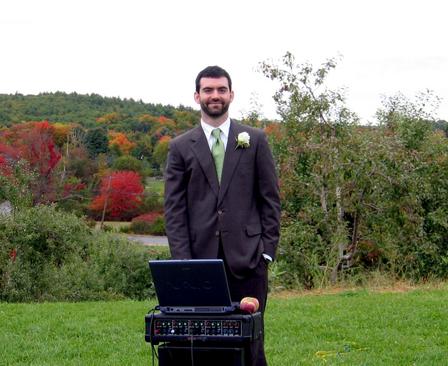
10.06.2005
hear and now

today on NPR, here and now aired an interview segment in which robin young asks me about mashups, the boston mashacre, and how playing tracy chapman against an aerosmith break relates to ethnomusicology. i did my best to explain and to demonstrate.
you can hear it here (and now).

10.04.2005
while you are reading this
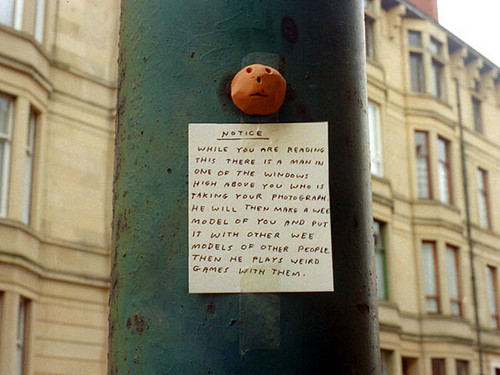
- get right: visit the center for a new american dream.
- not that i need point you to /jace/place, since you're probably either coming from there or on the way, but you should not miss dj/rupture's 10-step guide to selling out, nor should you miss his interview at fortune grey in which the man sagely holds forth on mp3bogging and the music industry in crisis.
- an iron butterfly bats its wings over at the garden of eden, and there's fog in cambridge.
- word freak? sate yourself over at the double-tongued word wrester.
- dubya tumbling through space: who knew the prez was so flexible? [link via sasha]
- sean paul: we be burnin', but not that kind of burnin'--not that there's anything wrong with that. his actual words: "It's really hurting the music on a monumental level." pragmatic, yup. more hedgy than edgy, mebbe. but a courageous and significant statement, no doubt. (and never mind that part about "jamaican rapper, TOK"--that's just distracting.) [link via ripley]
10.03.2005
RIP august wilson

playwright august wilson, a writer with an exquisite ear for black vernacular(s) and an ambitious chronicler of 20th century african-american experience, died yesterday from liver cancer at the all-too-young age of 60.
having taught wilson's fences to my highschoolers several years ago (and taken them to a performance of jitney), i had the pleasure of engaging with his work and watching young people respond to his rich language, his eye for plot and drama, and his grand sense of history.
admirers of august wilson can find some consolation in the fact that he was able to fulfill his extraordinarily ambitious goal to write a play documenting every decade of the 20th century. (he recently finished, and was able to watch a performance of, the last in the cycle, radio golf.) wilson's depiction of the toils and joys, the demons and devotions of several generations of families inhabiting the same pittsburgh neighborhood--reaching back into antebellum times and extending into the present--will no doubt prove an enduring, insightful representation of american life.
today we mourn the loss of an american poet. we give thanks for the lasting gifts he has left us.
10.02.2005
what would noam do?
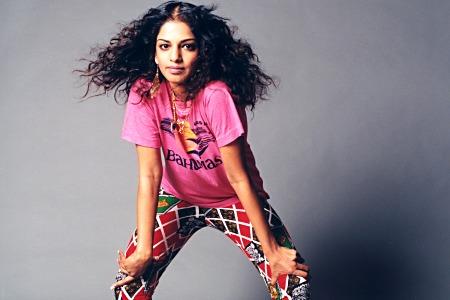
galang, gal: eat a food
as you all know, MIA has licensed, "galang"--the track that refuses to die (and refuses to hit, innit?)--to a honda commercial. already the cries of sellout vs. pragmatist echo 'cross the blogalog. about the deal, ms.arulpragasam allegedly had something like this to say at her recent boston concert appearance:
"Sorry to kill the party ... Two days ago, I had a fight with a friend because I sold 'Galang' to Honda ... Sometimes I think I shouldn't have done it. Maybe you guys don't give a shit ... But I hope I still have your support ... I'm a first generation immigrant, how else am I gonna make money so I can get it the people who need it? ... This is still my song. It doesn't belong to Honda."now, having still failed to weigh in on the great MIAsma (i'm ambivalent, natch), i'm afraid i don't have any kind of penetrating insight to offer on this latest move. obviously, this is a sticky, tricky issue, and various artists/entertainers have made compelling arguments for accepting or rejecting the advances of corporate money. i don't know much about honda, but i do know that they make decent, small cars (i drive one). moreover, i don't know much about MIA, but i know she makes decent, big chunes (i play some).
at any rate, i bring this up because i recently heard from a friend of mine who found himself in a similar position and decided to accept a licensing deal with a TV show that, though i haven't seen it, sounds like a gas.

noam weinstein, a fellow cambridge native and an acquaintance from high-school and college (but not, you'll note, a first-generation immigrant), announced to his mailing list last week that one could hear his music in this week's episode of showtime's weeds. noam's not only a great songwriter and performer, he's also hilarious, so, rather than paraphrasing, allow me to quote his own rationale for the decision:
Friends,now although noam can be as slippery as his lampooning brethren when it comes to playing with the truth, it seems to me that there's something inherently easier about accepting a deal with a show that you approve of than with a corporation that you might inherently distrust (not to forget that showtime is, of course, a corporate entity, or at least part of one). at any rate, i don't see any easy way out of this debate, but i guess that making these decisions according to which entities we admire and trust(?) and which we revile and suspect is at least some way forward.
When Tyler Wood and I released our album 'Probably Human' last year, we were quickly inundated with licensing offers from a variety of organizations and media outlets that felt it would suit their broadcast needs. Unfortunately, few of those needs were of a sort that Tyler and I felt comfortable aiding. Sure, milk helps strengthen the bones, but at what cost? Yes, it's an admirable goal to explain how branches of the government work, but for thirty boring minutes? And who are we to say if pretty ladies smell nice?
After a year of declining lucrative offers of this sort, we were finally approached by a cause that we're not only comfortable supporting, but proud to support. So this coming Monday, a one-minute clip from the song 'I Can Hurt People' will be played in the background during the final scene of Showtime's 10pm program 'Weeds,' about a suburban mother who deals marijuana.
Yours,
Noam
P.S. I think the episode will also air Wednesday and Friday, assuming those are just different names for Monday.
so in the absence of any real analysis on my part, let me flip it on you junichi-style (not to imply that junichi's posts are devoid of analysis--far from it):
if you were in the position to license your music/art/media for a commercial, television network/show, etc., which would you summarily reject and which would you endorse without hesitation?




